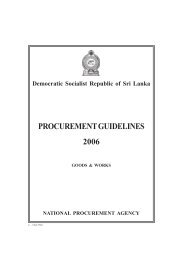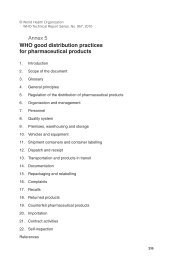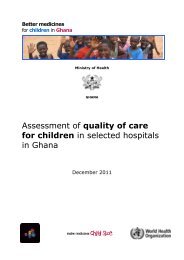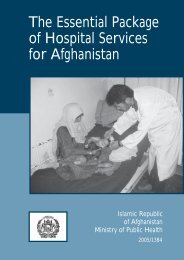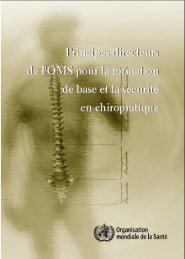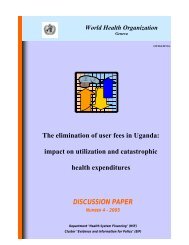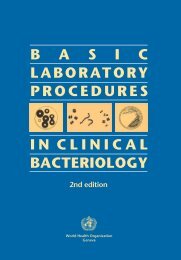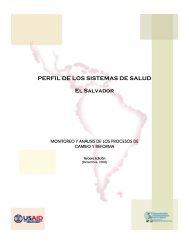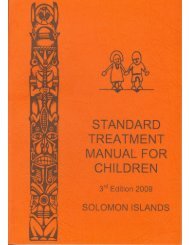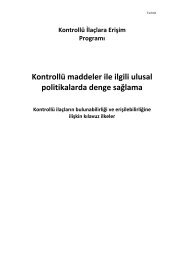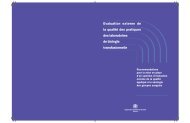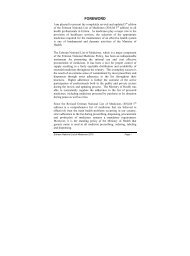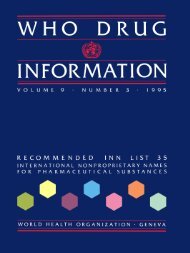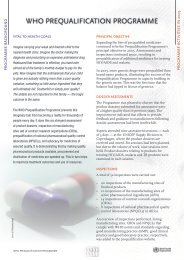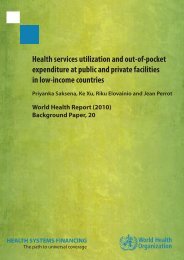Benchmarks for Training in Traditional Chinese Medicine
Benchmarks for Training in Traditional Chinese Medicine
Benchmarks for Training in Traditional Chinese Medicine
Create successful ePaper yourself
Turn your PDF publications into a flip-book with our unique Google optimized e-Paper software.
<strong>Benchmarks</strong> <strong>for</strong> tra<strong>in</strong><strong>in</strong>g <strong>in</strong> traditional Ch<strong>in</strong>ese medic<strong>in</strong>eType III tra<strong>in</strong><strong>in</strong>g programmes are aimed at practis<strong>in</strong>g TCM practitioners witheither no prior medical or other health-care tra<strong>in</strong><strong>in</strong>g, or <strong>in</strong>adequate tra<strong>in</strong><strong>in</strong>g.These programmes are designed to upgrade skills and to allow tra<strong>in</strong>ees to obta<strong>in</strong><strong>for</strong>mal qualifications <strong>for</strong> the qualified and safe practice of TCM. Type IIIprogrammes may <strong>in</strong>clude all of the components of Type I programmes, but thelength and components of this programme may vary substantially, depend<strong>in</strong>gupon the cl<strong>in</strong>ical experience of the tra<strong>in</strong>ee. The learn<strong>in</strong>g outcomes should becomparable to those of a Type I programme. Type III programmes may beoffered on a full-time or part-time basis.2.2 Benchmark learn<strong>in</strong>g outcomesTCM tra<strong>in</strong><strong>in</strong>g is expected to provide tra<strong>in</strong>ees with technical, communication,practice and <strong>in</strong><strong>for</strong>mation management skills and competencies (5,9).Technical skillsThe TCM practitioner should be able to:• describe normal human structures and functions and their relevance tothe prescription of TCM;• apply knowledge of TCM pr<strong>in</strong>ciples to the diagnosis of diseases;• identify cl<strong>in</strong>ical conditions and refer to other health-care professionalswhen required, and <strong>in</strong> a timely manner;• <strong>for</strong>mulate an appropriate TCM prescription based on an understand<strong>in</strong>g ofthe components and <strong>in</strong>dications and contra<strong>in</strong>dications of a number ofcommonly used Ch<strong>in</strong>ese Materia Medica and TCM <strong>for</strong>mulae;• develop specific treatment plans, <strong>in</strong>clud<strong>in</strong>g time-l<strong>in</strong>es <strong>for</strong> treatment andreview, based on <strong>in</strong>dividual patient signs and symptoms;• diagnose and differentiate diseases/disorders of <strong>in</strong>ternal medic<strong>in</strong>e,gynaecology, paediatrics, ear, nose, throat and ophthalmology,traumatology and dermatology accord<strong>in</strong>g to TCM pr<strong>in</strong>ciples andtechniques, and <strong>for</strong>mulate an appropriate treatment plan;• <strong>in</strong>terpret cl<strong>in</strong>ical laboratory f<strong>in</strong>d<strong>in</strong>gs;• give nutritional, dietary and preventive medical advice <strong>in</strong> terms of TCMknowledge;• modify TCM <strong>for</strong>mulae and/or treatment plans based on anunderstand<strong>in</strong>g of the components, <strong>in</strong>dications and contra<strong>in</strong>dications ofcurrently used western medications and potential <strong>in</strong>teraction amongthese therapies;• review and monitor the health of the patient and modify treatmentaccord<strong>in</strong>gly;• prepare and dispense TCM prescriptions;• report adverse drug reactions as per regulatory requirements;• <strong>in</strong>dependently acquire technical knowledge about diseases notnecessarily covered <strong>in</strong> the tra<strong>in</strong><strong>in</strong>g.Communication capabilitiesThe TCM practitioner should be able to:• appropriately apply TCM and western medical term<strong>in</strong>ologies <strong>in</strong> practice;8



